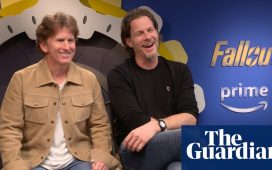
Inkle’s latest title made something of a splash when it launched this June. Of course, you’d expect a certain level of excitement for the latest release from the 80 Days and Heaven’s Vault creator – but the developer took a very different approach in the leadup to the launch of Overboard!
That is to say, they didn’t do anything at all. Inkle released their ‘you-done-it’ murder mystery (or their ‘reverse Poirot’, if you prefer) as a complete surprise. No pre-release hype, no trailers, no Steam wishlists and only a handful of review codes sent to outlets. For most of the games community, the first time they heard about Overboard! was when it was already out in the wild and available for purchase.
Still, Overboard! Immediately attracted media attention upon its release – aided by both the game’s surprise launch and its killer elevator pitch. In essence, Overboard! is a new take on the murder mystery genre, with the player taking on the role of the excellently named Veronica Villensey. Veronica has just thrown her husband off a boat, and the player has to watch what they say and and do in order to hide the murder from the rest of her shipmates.
The thing is, Inkle hadn’t known about the game for much longer than the rest of us. In fact, Overboard! was in development for approximately 100 days – meaning that, as Inkle’s Jon Ingold explains to us, the developers had no idea they’d be working on a murder mystery at the start of the year.
THE £8K GAME?
“When we first decided to do the project, we weren’t really intending to do a game,” Ingold begins. “It was January and lockdown, and everyone was feeling a bit miserable.
“Somebody asked us, ‘what game could you make for £8,000?’ And well, we can’t possibly make anything for that. But then when someone puts that idea in your head, you think ‘oh, that’s about half a month of income. If we were to make a game in a month, what kind of game would we make?
“And so the idea of a ‘you-done-it’ appeared around then. We thought well, maybe we could just knock something out. Maybe we could use it as an example that we could just put up for free, just for fun, just to have something – because it’s a cool idea. So I wrote the first pass at the script for it, which took about three weeks, and gave it to the rest of the team to play. And they really enjoyed it, and grew into this thing that we just liked enough that we wanted to make it a real game.”
Overboard! may have been upgraded to a ‘real game’, but it was still small enough in scope that the team felt it needed a different approach to their usual titles.
“It came from this idea of ‘well, this isn’t a real game. We can’t hype it up and launch it for real. So what we’ll have to do is do it as a surprise launch, and make it exciting.
“But as we grew closer to having it as a real game, and launching it as a real game, we started to wonder… is this really a sensible thing to do? Because launching on Steam with zero wishlists is pretty much throwing your game into the bin, unless you could do something else with it.”
Still, the team were excited by the prospect of a surprise launch, and so started to look at the Steam wishlist problem from another angle.
“When you launch a game on Steam and people wishlist it, that wishlisting means they don’t need to buy your game now to interact with it. They’ve already interacted with it, they’ve looked at it, they thought about it, they’ve imagined it, they put it on their wishlist.
“But they’ve got 1000 other games on their wishlist. So when it comes out, they don’t have to buy it. A wishlist is kind of a decision to not buy something right now – it’s better than being ignored completely, but it’s not a sale. And we thought, well, what happens if we just sidestep all of that? If we just ignore the way that steam works completely, if we just forget about that? And instead, we try to release something which is just pure joy. So it’s a surprise, it’s a delight. It’s exciting. And if you like the idea, you don’t put it on your wishlist and think about it in two weeks, you just play it right now. There’s none of that messing around. It’s just right now it’s right here, we’re giving it to you.”
The goal was to create a launch that was as joyful, funny and fast as the game itself is. Though that’s not to say Inkle had zero plans in place for launch day – reaching out to the press for launch day stories and reviews, with both IGN and Nintendo picking up the game’s trailer for their channels. Still, they were much quieter pre-launch than most developers would dare to be, which seems to have worked out well for Overboard!
“I think we got a lot more coverage at the moment of launch than we would have done any other way. Like, if we’d have pre-announced the launch day, I don’t think GameSpot would have posted a news story about it on the day of launch. So actually, what we got was a really good level of attention at that point, which was enough to feed steam enough wishlists to get it onto the Steam Store page.
“It feels like we did it the wrong way around. Instead of building up Steam in order to secure a visible launch, we secured a visible launch in order to build up Steam, but I think we’re better at doing it that way. On Steam, you’re competing against everybody. Whereas on Twitter, you’re just competing with whatever happens to be going on right now. And we got lucky with a day when there weren’t very many games coming out, and nothing too dramatic happened in the world.”
GREAT EXPECTATIONS
It seems to us that Overboard!’s excellent elevator pitch, matched with its shorter playtime, suits a launch strategy like this. Once the hook of a ‘reverse Poirot’ is in, it’s advantageous to reel them in immediately, rather than drop a distant launch date that might let your would-be player wriggle away. Additionally, once your game is out in the wild, it’s arguably better to limit how much time the player has to build expectations for your game.
“I think one of the things we’ve learned over the years is that if you want to make people really happy about a game, you have to give them an idea they can understand and then meet or exceed that idea. If you ever fall below the idea that they form in their heads, then you’ve failed. It doesn’t matter how good your game is. If you tell people you’re going to deliver this and you deliver that, that can be excellent, but it’s too late. It’s already a disappointment.”
A surprise launch might well be a good way to build excitement and counteract potential disappointment, but that’s not to say it’s a good strategy for every game. If you’re launching a 100-hour RPG with complex and involved mechanics, maybe don’t throw out your marketing campaign just yet.
“If we were to launch the Highlands game that we’re working on in a surprise way, I don’t know whether we would have the same kind of enthusiasm behind it. Because this is a project people don’t really know, and when you communicate it quickly it doesn’t have that immediate hook to it. It’s not obviously amazing. So that feels like a game we have to build up slowly over time.
“So I think it probably depends on the project. If we had something else which was short and immediate and fun, and grabby, I think we’d definitely consider a surprise launch. And for other studios, I think it really depends on how much of that initial groundswell you’ve got in the first place, and just how marketable that one idea is. Because you get half a second of attention on Twitter, and that has to work. For Overboard!, that’s doable, whereas for something like Heaven’s Vault it would absolutely not have been doable.”
We can’t help but wonder, talking to Ingold, that maybe this is really a trick you can only pull once. Surprise game launches are something of a rarity in the industry, which is what helped the enthusiasm around Overboard! But if people were to grow more used to the practice, would we start to see diminishing returns?
“We were talking about this internally just yesterday actually. Because yeah, if it’s always a surprise game….” Ingold pauses. “No, actually maybe that’s quite fun, they never know what to expect!
“But as soon as you surprise launch a game that people don’t like very much, maybe it breaks down. My overall gut feeling is that you either have to be absolutely solid in delivering what people expect, which is what you AAA studios do, or you have to be constantly surprising people and seeming interesting. And that’s the best place for an indie to be.
“I feel like whatever we do next, either has to be different, or it has to be a spin on something we’ve done. I don’t know… I mean, we tend to make these things up as we go along! We didn’t know we were making a surprise game on New Year’s Day this year. So I think it’s also okay to be entirely reactive and emotional about this stuff as well, which is quite fun.”
APRIL FOOLS
Now, we’ve been calling Overboard!’s launch a surprise, but that isn’t entirely true. The game was actually announced months in advance – it’s just that nobody realised it at the time.
Much to the delight of Inkle’s beloved (and long-suffering) PR, Ingold actually announced the game via Twitter. On April Fool’s day.
The Tweet reads as follows:
“Is it still April Fool’s day? Great. We’re going to release a new game next month or something that we made in two months and it’s about a multiple murderer who hates dolphins and talks to God and the soundtrack was recorded on wax cylinder. Am I doing this right?”
The Tweet, at the time, went over all of our heads. But infuriatingly, every element (well, almost, the game eventually launched in June) of that Tweet turned out to be true.
It confirms three things to us. One, Jon Ingold is an evil genius. Two, he can never make an April Fool’s joke again for the rest of his life. And third, his PR must hate him.
“I wasn’t too bothered,” laughs Ingold. “But Emily Morganti, our PR person, was really stressed about it. When I’m developing a game and thinking about it, I kind of want to talk about it. And so there were quite a few things I tweeted, which was me talking about the game without talking about the game.
“And Emily would write to me saying ‘Okay, fine. But please don’t do that again!’ And I’m like ‘oh alright, I’m not going to do that again.’ And then three weeks later ‘Oh! I’ve got an idea! I’m doing it again!’”
You have our sympathies, Emily.
DOES SURPRISE SELL?
But what impact does a surprise launch have on lifetime sales? It’s certainly true that most games will see the lion’s share of their sales on launch day – and this feels particularly true of a surprise launch. But as the excitement of an unexpected new Inkle title settles down, and it stops being the topic of the moment, will it see a sharper decline in sales than if it’d had a prolonged marketing campaign behind it? Speaking to Ingold in the week of the game’s launch it’s perhaps too early to tell, though early signs look promising.
“One thing that we’ve noticed so far is, yeah we did get more sales on the day of launch, but not astronomically more. Normally you have a sales spike, which then tails off to about maybe a quarter or a fifth on day two. Because of that wishlisting – the wishlists clear out and then it’s just natural turnover.
“So the weird thing for us was we had a launch spike, driven by the news articles, and just positivity I guess. And then we had a kind of dip, where everyone was like, ‘well, I bought it now.’ And then Steam woke up and suddenly, we were back up again. We’ve been fairly solid all week, it’s kind of been amazing. We’ve been sitting in the new and trending chart on Steam all week, which was a huge relief, because we thought we wouldn’t even get into it because we had zero wishlists.
“But what happens from here is really difficult to say. There’s some featuring on the Switch, which I know is time based, so we’ll fall off that screen at some point, and we’re gonna fall off new and trending within the next few days on Steam, I should think.
“At that point, it comes down to whether people remember it or not. But then again, we probably have a lot of reviews still to come, right? Because normally all your reviews hit at exactly the same time, but because we didn’t send out very many review codes, hopefully we’ll get a couple of big reviews down the line. But really, the best thing about it is because it was a quick game, it was fairly cheap to produce. So we’ve covered the costs already.
“It feels to me like, from this point on, it’s probably a solid release. Before now, we didn’t have a popular, well received game at the cheaper indie price point. So it’ll be interesting to see what happens with it. But I mean, we can’t really complain. It’s been perfectly successful, our gambit of surprise seems to have worked!”

















